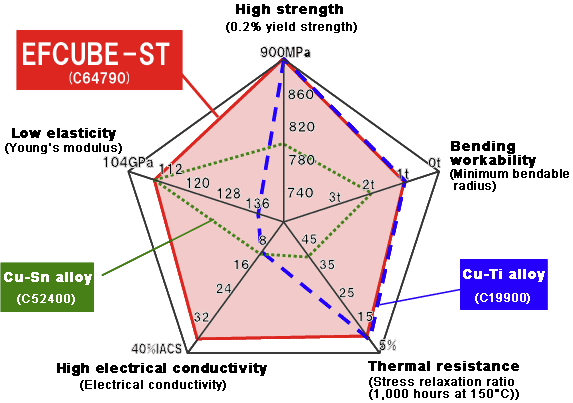December 19, 2011
Furukawa Electric Co., Ltd. has developed high-strength copper Corson alloy strip EFCUBE-ST, as an electrical contact material (terminal material) used for ultra-compact connectors mounted on thin electronic devices.
The product adopts a high-density Corson alloy (note 1) that meets needs for high springing properties, and features high bending workability and a low Young's modulus (note 2) made possible by Furukawa Electric's proprietary metal structure control technologies.
Samples are already being shipped to major connector manufacturers. Monthly production of 300 tons is targeted in fiscal 2013, combined with EFCUBE-820(C64775) and other Corson alloy products already being mass produced.
Background of development
With connectors mounted on smartphones, tablets and other thin mobile electronic devices, smaller sizes, reduced height, and multipolar structures are demanded. Copper alloy strips for connectors used on these devices need to possess contradictory properties, namely high springing properties and favorable bending workability. In addition, favorable elasticity (a low Young's modulus) that resists permanent deformation and high electrical conductivity are demanded, in line with the decrease in length and the cross-section area of terminals. Conventional high-strength copper alloys (titanium-copper alloy and beryllium-copper alloy) only offer insufficient electrical conductivity and elasticity, and also pose issues in terms of costs.
Features of developed product
Furukawa Electric has developed the high-strength alloy strip EFCUBE-ST, to replace existing titanium-copper alloy strips. The developed product features high strength based on high-concentration Corson alloy, with significantly improved bending workability, something that had been an issue with high-strength Corson alloy strips. These properties have been made possible by applying the proprietary metal structure control technologies.
By aligning crystal orientations in a direction effective for improving their properties, favorable bending workability (minimum bendable radius (note 3): 1t) has been realized, in addition to high strength (yield strength: 900MPa) and a Young's modulus as low as that of phosphor bronze (110GPa). Consequently, the product helps to boost the connection reliability (note 4) of connectors. With roughly triple the electrical conductivity (35% IACS) of phosphor bronze and titanium-copper alloys combined with high thermal resistance (stress relaxation properties), the product is also ideal for connectors used with advanced devices and batteries and other power source systems loaded with large electrical currents.
EFCUBE-ST is an alloy made by precipitation of Ni-Si compounds at a high concentration. Using the cutting-edge facilities newly introduced to Copper Strips Division (Nikko), stable structure control has become possible, enabling a groundbreaking copper alloy strip to be developed.
Also, industry-leading plate thickness accuracy and surface quality have been achieved using production technologies cultivated with lead frame materials and other products.
EFCUBE-ST has been developed to meet needs for more advanced functions than those provided by EFCUBE-820, developed last year, and is set to contribute to further reductions in the dimensions of thin mobile electronic devices.
Comparison of properties with other materials
(Note) The numerals indicate typical values
| Product type | Phosphor bronze (C52400) |
Titanium-copper alloy (C19900) |
EFCUBE-ST developed by Furukawa Electric (C64790) |
|
|---|---|---|---|---|
| Properties | ||||
| Electrical property | Conductivity (%IACS) |
× 10 |
× 10 |
○ 35 |
| Springing property | 0.2% yield strength (MPa) |
○ 800 |
○ 900 |
○ 900 |
| Resistance against permanent deformation | Young’s modulus (GPa) |
○ 110 |
× 135 |
○ 110 |
| Bending workability | MBR (note 3) (Width: 1mm) |
× 2t |
○ 1t |
○ 1t |
| Thermal resistance | Stress relaxation properties | × | ○ | ○ |
| Costs | ◎ | × | ○ | |

Explanation on terms
(Note 1)Corson alloys:
Alloys made by adding Ni and Si to Cu, precipitation hardening alloy of Ni-Si compounds through refined dispersion
(Note 2)Young's modulus:
A constant of the proportionate relationship between stress and strain in the elastic region. A lower Young's modulus improves the degree of freedom in design, as a larger elastic strain may be permitted before permanent deformation starts.
(Note 3)Minimum bendable radius:
The minimum bending radius that allows bending without cracks, usually indicated in multiples of plate thickness. The smaller the bendable radius, the better the bending workability.
(Note 4)Connection reliability:
The rises in contact resistance at an electrical contact point (improper conduction) occurs due to a decline in the contacting pressure. A typical example is a decline in strength (relaxation of stress) caused by permanent deformation of the strip material at the initial interlocking and a creep phenomenon when the material is stored at high temperatures. To prevent this, not only the connector design, but also the strength, elasticity, stress relaxation properties, and electrical conductivity of copper alloy contacting material are vital.